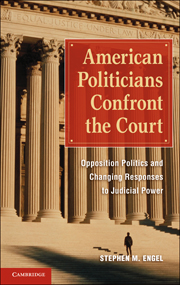 American Politicians Confront the Court
American Politicians Confront the Court Published online by Cambridge University Press: 05 June 2012
Politicians have challenged the judiciary's legitimate independent authority throughout American history. Yet scholars contend that the judiciary, and particularly the Supreme Court, has become more powerful and secure over time. Nothing in twentieth-century American politics matches how Jeffersonians reined in the judiciary in the early 1800s or what congressional Republicans achieved in the 1860s. Franklin Delano Roosevelt's (FDR's) court-packing plan collapsed and the impeachment and jurisdiction-curbing threats lobbed against the Warren Court went nowhere. Recent attacks notwithstanding, the Court is unfazed; it and has “intensified its political activity” since the mid-twentieth century, and it shows “few signs of reversing course.” Some scholars assert not only that the judiciary reigns supreme in matters of constitutional interpretation but that such supremacy has been deliberately sought and constructed by elected politicians.
It appears that attacks focused on the Court's democratic deficit have become less potent over time even as the polity as a whole has become more democratic. One way to reconcile this paradox is to suggest that judicial aggrandizement has not come at the expense of the elected branches. Political attacks on the federal courts that do not result in undermining judicial power could be a win-win for all sides. Or, a strong judiciary might serve some advantage despite its countermajoritarian potential, and thus that potential needs to be grudgingly accommodated.
To save this book to your Kindle, first ensure no-reply@cambridge.org is added to your Approved Personal Document E-mail List under your Personal Document Settings on the Manage Your Content and Devices page of your Amazon account. Then enter the ‘name’ part of your Kindle email address below. Find out more about saving to your Kindle.
Note you can select to save to either the @free.kindle.com or @kindle.com variations. ‘@free.kindle.com’ emails are free but can only be saved to your device when it is connected to wi-fi. ‘@kindle.com’ emails can be delivered even when you are not connected to wi-fi, but note that service fees apply.
Find out more about the Kindle Personal Document Service.
To save content items to your account, please confirm that you agree to abide by our usage policies. If this is the first time you use this feature, you will be asked to authorise Cambridge Core to connect with your account. Find out more about saving content to Dropbox.
To save content items to your account, please confirm that you agree to abide by our usage policies. If this is the first time you use this feature, you will be asked to authorise Cambridge Core to connect with your account. Find out more about saving content to Google Drive.